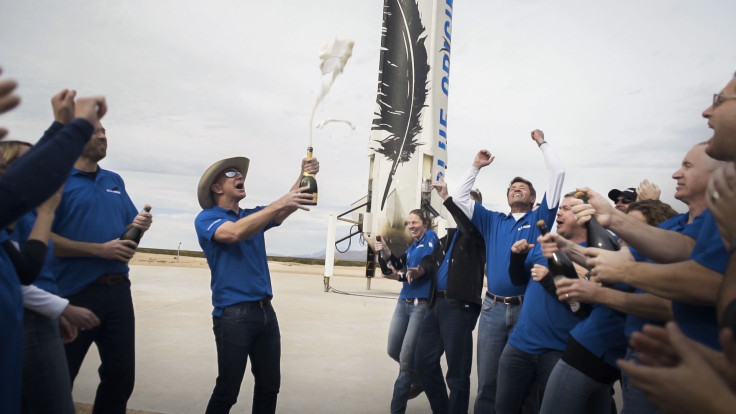Jeff Bezos' Blue Origin Beats SpaceX, Elon Musk In Reusable Rocket Race, Sort Of

Jeff Bezos' upstart space company Blue Origin managed to launch a rocket and then land it Monday night in a controlled descent back to the launch pad. It's an impressive feat that has so far eluded his main private space competitor, Elon Musk's SpaceX.
Blue Origin launched the New Shepard rocket 329,839 feet above the surface of the Earth before pulling off the hard part: getting down without a parachute. It's an impressive step in the quest to achieve a reusable rocket, but there are many hurdles that have yet to be cleared.
Spaceflight has always relied on expendable rockets, but rockets that can be landed and reused later would drastically reduce the cost of launches. Blue Origin's New Shepard is powered by the BE-3 liquid hydrogen rocket engine capable of producing 110,000 pounds of thrust.
SpaceX's landing attempts are much different from what Blue Origin achieved Monday. The Falcon rocket landings occurred after sending the Dragon spacecraft to the International Space Station, located in geostationary transit orbit (GTO). While Blue Origin traveled 62 miles above Earth's surface while the International Space Station is around 249 miles above Earth.
It is, however, important to clear up the difference between "space" and "orbit", as described well by https://t.co/7PD42m37fZ
— Elon Musk (@elonmusk) November 24, 2015Getting to GTO requires much more speed than going to space thus making it harder to decelerate and control the rocket after it returns to Earth. The attempts have been unsuccessful, but delivered valuable information for the company for its future attempts to create a reusable rocket. Another distinction is what is being recovered. "SpaceX is only trying to recover their first stage booster, which of course is suborbital," Bezos said.
"Rockets have always been expendable. Not anymore. Now safely tucked away at our launch site in West Texas is the rarest of beasts, a used rocket," Bezos said in a statement. After reaching its test altitude, the rocket returned to Earth by re-igniting the BE-3 engine to reduce the rocket's speed. After the landing gear was deployed, New Shepard touched down on the launch pad at a speed of 4.4 mph. "We are building Blue Origin to seed an enduring human presence in space, to help us move beyond this blue planet that is the origin of all we know," Bezos said.
Blue Origins is developing partnerships to launch small payloads to space as part of its space tourism business. The company announced a production agreement with United Launch Alliance for the upcoming BE-4 engine. These engines would power ULA's Vulcan rocket while easing the dependence on Russian-made RD-180 engines. ULA was unable to bid for a GPS satellite launch contract due to a law banning the use of the engines for military launches after 2019.
© Copyright IBTimes 2024. All rights reserved.












